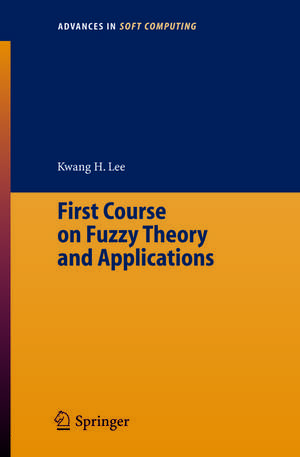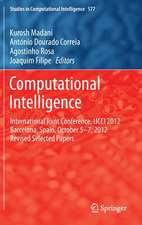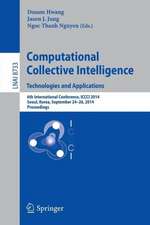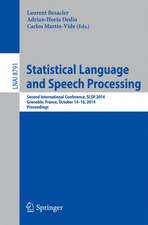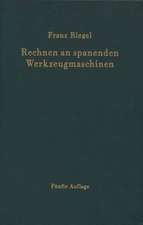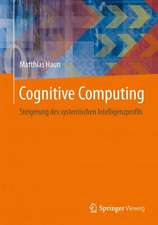First Course on Fuzzy Theory and Applications: Advances in Intelligent and Soft Computing, cartea 27
Autor Kwang Hyung Leeen Limba Engleză Paperback – 7 oct 2004
Din seria Advances in Intelligent and Soft Computing
- 18%
 Preț: 2813.03 lei
Preț: 2813.03 lei - 20%
 Preț: 1273.74 lei
Preț: 1273.74 lei - 18%
 Preț: 1214.72 lei
Preț: 1214.72 lei - 18%
 Preț: 1221.07 lei
Preț: 1221.07 lei - 20%
 Preț: 653.06 lei
Preț: 653.06 lei - 20%
 Preț: 1919.02 lei
Preț: 1919.02 lei - 20%
 Preț: 984.04 lei
Preț: 984.04 lei - 20%
 Preț: 1746.09 lei
Preț: 1746.09 lei - 20%
 Preț: 1906.99 lei
Preț: 1906.99 lei - 20%
 Preț: 1763.75 lei
Preț: 1763.75 lei - 20%
 Preț: 1278.68 lei
Preț: 1278.68 lei - 20%
 Preț: 1926.61 lei
Preț: 1926.61 lei - 20%
 Preț: 3183.20 lei
Preț: 3183.20 lei - 20%
 Preț: 334.86 lei
Preț: 334.86 lei - 20%
 Preț: 1916.55 lei
Preț: 1916.55 lei - 20%
 Preț: 981.25 lei
Preț: 981.25 lei - 20%
 Preț: 1934.70 lei
Preț: 1934.70 lei - 20%
 Preț: 1932.07 lei
Preț: 1932.07 lei - 20%
 Preț: 979.71 lei
Preț: 979.71 lei - 20%
 Preț: 1920.84 lei
Preț: 1920.84 lei - 15%
 Preț: 647.92 lei
Preț: 647.92 lei - 20%
 Preț: 985.86 lei
Preț: 985.86 lei - 20%
 Preț: 641.16 lei
Preț: 641.16 lei - 20%
 Preț: 3174.14 lei
Preț: 3174.14 lei - 20%
 Preț: 1293.71 lei
Preț: 1293.71 lei - 20%
 Preț: 2890.01 lei
Preț: 2890.01 lei - 20%
 Preț: 1924.15 lei
Preț: 1924.15 lei - 20%
 Preț: 1901.71 lei
Preț: 1901.71 lei - 20%
 Preț: 1934.70 lei
Preț: 1934.70 lei - 20%
 Preț: 1918.04 lei
Preț: 1918.04 lei - 20%
 Preț: 1919.02 lei
Preț: 1919.02 lei - 20%
 Preț: 419.25 lei
Preț: 419.25 lei - 20%
 Preț: 1310.68 lei
Preț: 1310.68 lei - 20%
 Preț: 1931.42 lei
Preț: 1931.42 lei - 20%
 Preț: 1941.96 lei
Preț: 1941.96 lei - 20%
 Preț: 2217.66 lei
Preț: 2217.66 lei - 20%
 Preț: 1297.17 lei
Preț: 1297.17 lei - 20%
 Preț: 1295.71 lei
Preț: 1295.71 lei - 20%
 Preț: 1306.07 lei
Preț: 1306.07 lei - 20%
 Preț: 1277.06 lei
Preț: 1277.06 lei - 20%
 Preț: 1909.64 lei
Preț: 1909.64 lei - 20%
 Preț: 668.07 lei
Preț: 668.07 lei
Preț: 591.00 lei
Preț vechi: 738.76 lei
-20% Nou
Puncte Express: 887
Preț estimativ în valută:
113.09€ • 120.93$ • 94.29£
113.09€ • 120.93$ • 94.29£
Carte tipărită la comandă
Livrare economică 18 aprilie-02 mai
Preluare comenzi: 021 569.72.76
Specificații
ISBN-13: 9783540229889
ISBN-10: 3540229884
Pagini: 348
Ilustrații: X, 335 p. 149 illus.
Dimensiuni: 155 x 235 x 18 mm
Greutate: 0.49 kg
Ediția:2005
Editura: Springer Berlin, Heidelberg
Colecția Springer
Seria Advances in Intelligent and Soft Computing
Locul publicării:Berlin, Heidelberg, Germany
ISBN-10: 3540229884
Pagini: 348
Ilustrații: X, 335 p. 149 illus.
Dimensiuni: 155 x 235 x 18 mm
Greutate: 0.49 kg
Ediția:2005
Editura: Springer Berlin, Heidelberg
Colecția Springer
Seria Advances in Intelligent and Soft Computing
Locul publicării:Berlin, Heidelberg, Germany
Public țintă
ResearchCuprins
Fuzzy Sets.- The Operation of Fuzzy Set.- Fuzzy Relation and Composition.- Fuzzy Graph and Relation.- Fuzzy Number.- Fuzzy Function.- Probabilisy and Uncertainty.- Fuzzy Logic.- Fuzzy Inference.- Fuzzy Control and Fuzzy Expert Systems.- Fusion of Fuzzy System and Neural Networks.- Fusion of Fuzzy Systems and Genetic Algorithms.
Recenzii
From the reviews:“This book is published under the Springer series Advances in Soft Computing, which covers a variety of topics, such as fuzzy sets, rough sets, neural networks, and evolutionary computations. … contains numerous illustrations of the concepts, examples, and exercises at the end of each chapter. … an excellent book for reference as well as for studying during a course. … This book is intended for an introductory graduate or advanced undergraduate course … recommended for students, scientists, engineers and professionals in the field for self-study.” (Zachary Richards and Haisam Osman, International Journal of Acoustics and Vibration, Vol. 14 (4), 2009)
Textul de pe ultima copertă
This basic textbook gives an easily accessible introduction to Fuzzy theory and its applications. It provides basic and concrete concepts of the field in a self-contained, condensed and understandable style. This "First Course on Fuzzy Theory and Applications" includes numerous examples, descriptive illustrations and figures of the basic concepts, as well as exercises at the end of each chapter. The author has long time experience in teaching on fuzzy theory and its applications and continuously developed and summarized his didactic lecture notes into this book. This book can be used in introductory graduate and undergraduate courses in Fuzziness and Soft Computing and is recommendable to students, scientists, engineers, or professionals in the field for self-study.
Caracteristici
Easily accessible introduction to fuzzy theory and its applications Provides basic and concrete concepts of the field in a self-contained, condensed and understandable style
